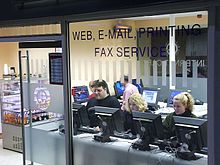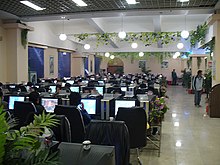Internet cafe
An Internet café is a company with at least one Internet connection that a group of people or all people can use - usually for a fee - to surf the World Wide Web . Often drinks and snacks are offered for sale. Internet cafés are very often combined with private telephone booths (also called telecafes or call shops ) and the sale of international telephone cards. In English-speaking countries in particular, Internet cafes are usually called cybercafés (neologism from the words cyberspace and café ).
Occurrence
Internet cafés can be located in publicly accessible places, for example in a library or in a fast food restaurant . Companies, associations, social institutions and educational institutions make Internet cafés available to their employees, members or young people. Most internet cafés are small, standalone, commercial establishments with a shop character. Their number is declining in industrialized nations, while they are booming in emerging and in some cases also in developing countries , since very few people there have a computer and even fewer have (really fast) Internet access. Both can be offered in internet cafés.
History and Outlook
Internet cafes became popular in the USA in 1994 , and today they can be found in almost every major city. The largest is located in the Theater District of Manhattan , New York City , and is called easyInternetcafé - the largest chain of its kind in the world. Cyberia in London was one of the first internet cafés in Europe . The first internet café in Germany was probably opened on July 1, 1994 in Fürth ( Falken's Maze ).
In Germany, the number of internet cafés has been declining since the smartphone revolution, as more and more people have their own internet access. In public places, hot spots for wireless LAN are displacing Internet cafés, as users now prefer to surf with their own mobile device. Until around the end of the 2000s, the prevalence in districts with a high proportion of migrants was still strong. There they were and are mostly run by migrants. However, their number there also fell sharply in the 2010s.

In holiday areas such as Gran Canaria or even in the Mount Everest region (e.g. in Namche Bazar and even in Dingboche ), on the other hand, internet cafés, often also as stationary internet corners in hotel lobbies, are still widespread. For some long-distance travelers, they are still an important communication point, but they are often made superfluous by WLAN in many hotels and restaurants.
Internet cafés are still ubiquitous (as of 2019) in many developing and emerging countries. However, Internet surfing has been taking a back seat to the use of multiplayer online battle arenas and other video games since around 2010 , so that you typically meet young people from the respective city district.
Internet café options
An internet café is primarily used to provide paid access to the internet, such as web-based e-mail services. In addition, other services such as transferring data to data carriers , printing, digitizing images or loading prepaid cards for cell phones may be possible. Games networked across several PCs are also popular in Internet cafés.
hardware
If an internet café is used by many people, the devices are often housed in more robust housings. The keyboard and the mouse or the touchpad in particular are at risk from vandalism and theft. Floppy disk drives, CD drives and card readers are sometimes dispensed with in order to at least rule out these possibilities for manipulating or smuggling malware . A coin mechanism or a reader for debit and credit cards enables fee-based surfing. Several internet terminals can be connected to an internet server. Larger internet cafés can be looked after by specially trained employees. Internet cafés of this kind usually do not have computers with a coin mechanism or readers for debit and credit cards because payment is made at a cash register.
software
Instead of the usual web browsers such as Internet Explorer , Netscape or Firefox , systems are often used that can perform additional tasks: billing the surfing session, blocking pages harmful to minors, providing free or paid games, clearing the browser cache and all cookies after logging out the last one Users, statistical evaluations, maintenance functions, etc. The connection to the Internet is usually carried out via DSL access . The Internet Explorer and Mozilla Firefox browsers are still available in most cafes.
Problems in Germany
Internet café operators have to observe many legal regulations. It must be ensured that users under the age of 18 cannot view any content that is harmful to minors, be it on their own or someone else's screen. The offering of games at Internet terminals is problematic. According to a ruling by the Federal Administrative Court, an internet café that mainly offers games is a gambling hall-like operation, which is therefore subject to authorization. However, only a very small number of internet cafés have a corresponding gambling hall permit.
In Germany there is no ID requirement to visit Internet cafes. This can lead a user to believe that they are in a state of absolute safety from prosecution. This is not the case, however, because video surveillance is often carried out, which, even if the operator does not recognize any criminal act or disturbance of the peace, is archived for investigative authorities. Therefore, postings relevant to criminal law can also be traced in internet cafés, even if the visitor has not made any treacherous entries.
See also
Web links
- Links & Law - Legal requirements for running an internet cafe


